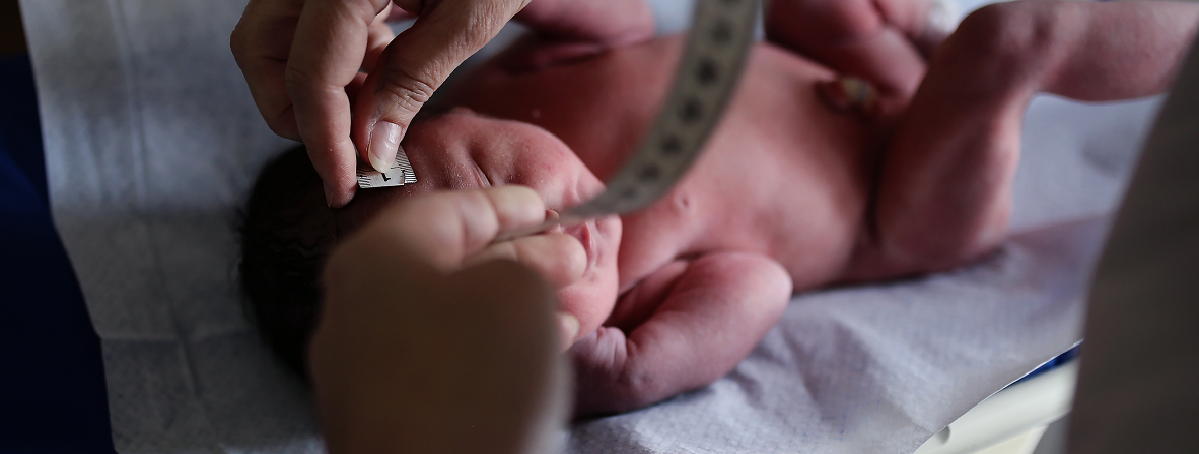Newborn examinations and PKU test

It’s finally happened! Your baby is here and you are a parent. If it all went without any complications, the baby will land directly in your arms for rest and comfort. After that, your new bundle of joy will have to undergo a number of examinations and a PKU test.
The moment after birth, the baby is usually placed directly on the mother’s chest, whether the baby was born vaginally or via C-section. Skin-to-skin contact is important, because it makes adjusting to the new world slightly less dramatic. Bonding and breastfeeding also benefit from the baby having immediate skin contact, so the midwife will wait a little while before doing that first important assessment, known as the Apgar test.
The Apgar scale – what is checked on a newborn?
The midwife will assess the baby’s well-being using a system known as the Apgar scale. They will look at the baby’s:
- Appearance (skin colour)
- Pulse (heart rate)
- Grimace response (reflexes)
- Activity (muscle tone)
- Respiration (breathing rate and effort)
The baby is given a maximum of two points per component, and every area is checked after one, five and ten minutes. It is common for the baby to score 9-10-10 right after birth, with a deduction for appearance after one minute, which is completely normal. Once the baby has been breathing for a little while, they will usually be given full points – it’s not so surprising that the baby needs to practice a bit to get their lungs to work, given that this is their first experience with air. These assessments are quick and the baby can stay with their parents, skin to skin. The baby may be given an injection of vitamin K to improve the ability of the blood to clot and to prevent bleeding immediately after birth.
At the same time, they will also be wiped clean and the umbilical cord will be cut. Delayed umbilical cord clamping is more the rule than the exception in Sweden these days. This means you will wait a few minutes to cut the umbilical cord, because waiting has been shown to reduce the risk of iron deficiency, among other things, for the baby. The baby will also be weighed and measured, including length and head circumference.
The first examination
The first examination of a newborn baby is usually done within two hours of the baby’s arrival. The midwife will look at the baby’s mouth and use a finger to check that the roof of the mouth is intact, ensuring that the baby can suckle. They will also check the head, fontanelles, and the sutures where the skull joins together. They will use a thermometer to check that the rectum is open, and will take that chance to check the baby’s temperature.
Within a day or so after birth, a doctor will give the infant a thorough physical examination. At that point, they will look at the baby’s general appearance and check for any skin changes. The doctor will listen to the baby’s lungs and heart, assess their head, abdomen and reflexes, and examine the hips, eyes and back, and the scrotum in boys.
They will also conduct a hearing test, either before you go home or when you return for a checkup. It’s not so unusual for babies to have somewhat poor hearing – possibly because their ears are clogged with vernix. If the baby doesn’t pass the hearing exam with flying colours, you will most likely return for another test. Before you go home, the newborn will also be checked for neonatal jaundice.
When do you go home from the postnatal ward?
If you had a normal pregnancy and both you and the baby are faring well after the delivery, then you can go home already six to eight hours after your baby’s arrival, and after a paediatrician has examined the little one. But it’s more common to take the chance to adjust and catch your breath for a while; in Sweden, most people stay at the hospital for a day or two.
PKU test after two days
Once at least two days have passed since the baby first arrived in your arms, a PKU test will be run. This blood test is given to all newborn babies to check for any rare metabolic disorders. The illnesses they are looking for are treatable, but early diagnosis is important. If the test indicates any abnormalities – which is extremely rare – then treatment will be done early for preventive purposes. The sample is collected by needle, often from the hand, when the baby is more than 48 hours old; you will have the result within a week. Often, the baby will be given a little sugar solution and therefore won’t particularly notice the prick from the needle.
The PKU test is named for a disorder, phenylketonuria, and has been given to all babies in Sweden since the 1960s. Sometimes, the blood sample is collected when you return to the hospital for a checkup if you’ve gone home within 48 hours. Of the approximately 110,000 babies born in Sweden each year, only about 70 have any of the conditions that are tested for.
Please note that all information above is based on Swedish recommendations.
